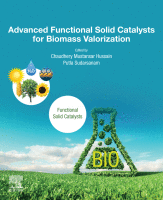Browse content
Table of contents
Actions for selected chapters
- Full text access
- Book chapterAbstract only
Chapter 1 - The role of catalysis in green synthesis of chemicals for sustainable future
Baithy Mallesham, Deepak Raikwar and Debaprasad Shee
Pages 1-37 - Book chapterAbstract only
Chapter 2 - Production techniques of functional solid catalysts
Tatiparthi Vikram Sagar and Burri Abhishek
Pages 39-75 - Book chapterAbstract only
Chapter 3 - Properties of functional solid catalysts and their characterization using various analytical techniques
Deepa Dumbre and Vasant R. Choudhary
Pages 77-88 - Book chapterAbstract only
Chapter 4 - Classification, characterization, and properties of edible and non-edible biomass feedstocks
Sreedhar Gundekari, Joyee Mitra and Mohan Varkolu
Pages 89-120 - Book chapterAbstract only
Chapter 5 - Heteroatom modified carbon nanomaterials as metal-free catalysts for lignocellulosic carbohydrate valorization
Navneet Kumar Gupta, Vishal Chauhan, ... Sanjeev Kumar Gupta
Pages 121-140 - Book chapterAbstract only
Chapter 6 - Zeolite-related catalysts for biomass-derived sugar valorization
Zhaozhuo Yu, Hongguo Wu, ... Song Yang
Pages 141-159 - Book chapterAbstract only
Chapter 7 - Mesoporous silica-related catalysts for biomass valorization
Venkata Pramod Chodimella
Pages 161-185 - Book chapterAbstract only
Chapter 8 - Metal-organic frameworks-based catalysts for biomass valorization
Francisco G. Cirujano and Nuria Martín
Pages 187-198 - Book chapterAbstract only
Chapter 9 - Functional magnetic catalysts for the synthesis of biomass-derived fuels and chemicals
Hari Prasad Reddy Kannapu, Hari Babu Bathula and Young-Woong Suh
Pages 199-223 - Book chapterAbstract only
Chapter 10 - Challenges and future prospects in heterogeneous catalysis for biorefinery technologies
S. M. A. Hakim Siddiki and Abeda Sultana Touchy
Pages 225-250 - Book chapterNo access
Index
Pages 251-258
About the book
Description
Advanced Functional Solid Catalysts for Biomass Valorization presents the basic concepts in catalysis (homogeneous, heterogeneous, and enzymatic) and the properties of various kinds of heterogeneous solid catalysts, including their structure, porosity, particle size, BET surface area, acid-base, and redox properties. Useful information about biorefineries, types of biomass feedstocks, their structures and properties as well as about several potential catalytic routes for biomass upgrading to useful fuels and chemicals is provided in this book. Importantly, this book covers the most recent developments toward functionalization of various solid catalysts, optimization of catalysts’ properties, developing cascade catalytic strategies, exploring reaction kinetics/mechanisms, and evaluating catalysts’ stability/reusability during biomass upgrading. Current challenges and opportunities for the future biorefineries as well as for the design of advanced functional solid catalysts are critically discussed.
Advanced Functional Solid Catalysts for Biomass Valorization presents the basic concepts in catalysis (homogeneous, heterogeneous, and enzymatic) and the properties of various kinds of heterogeneous solid catalysts, including their structure, porosity, particle size, BET surface area, acid-base, and redox properties. Useful information about biorefineries, types of biomass feedstocks, their structures and properties as well as about several potential catalytic routes for biomass upgrading to useful fuels and chemicals is provided in this book. Importantly, this book covers the most recent developments toward functionalization of various solid catalysts, optimization of catalysts’ properties, developing cascade catalytic strategies, exploring reaction kinetics/mechanisms, and evaluating catalysts’ stability/reusability during biomass upgrading. Current challenges and opportunities for the future biorefineries as well as for the design of advanced functional solid catalysts are critically discussed.
Key Features
- Describes catalysis as a promising technology for the development of eco-friendly and economically viable strategies for several important energy and environmental applications.
- Covers heterogeneous solid catalysts because of their versatile benefits in terms of catalysts’ synthesis, production cost, stability, and reusability as compared to homogeneous liquid catalysts.
- Provides promising strategies for the design of new catalytic materials, such as carbon materials, metal–organic frameworks, zeolites, and mesoporous silicas.
- Describes functional solid catalysts for developing one-pot cascade processes for efficient biomass valorization and other vital chemical transformations.
- Describes catalysis as a promising technology for the development of eco-friendly and economically viable strategies for several important energy and environmental applications.
- Covers heterogeneous solid catalysts because of their versatile benefits in terms of catalysts’ synthesis, production cost, stability, and reusability as compared to homogeneous liquid catalysts.
- Provides promising strategies for the design of new catalytic materials, such as carbon materials, metal–organic frameworks, zeolites, and mesoporous silicas.
- Describes functional solid catalysts for developing one-pot cascade processes for efficient biomass valorization and other vital chemical transformations.
Details
ISBN
978-0-12-820236-4
Language
English
Published
2020
Copyright
Copyright © 2020 Elsevier Inc. All rights reserved.
Imprint
Elsevier
